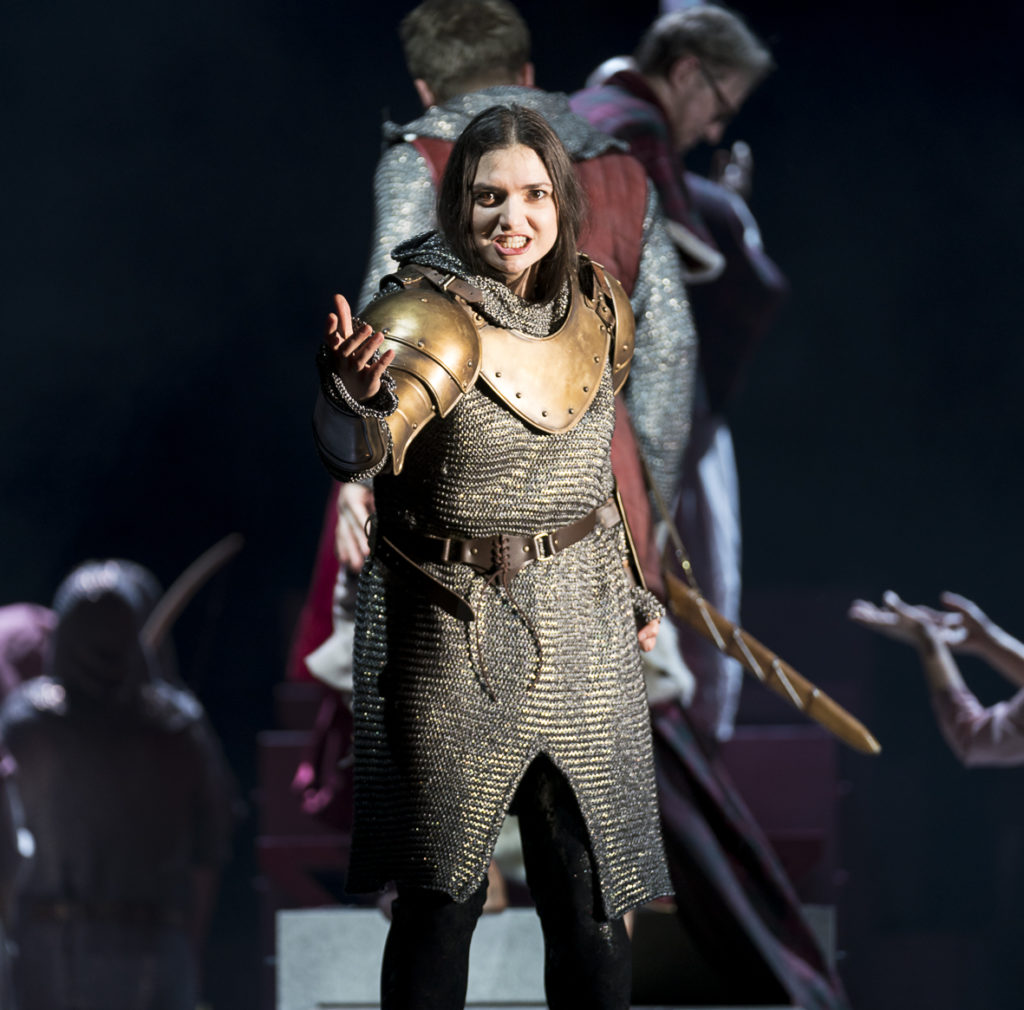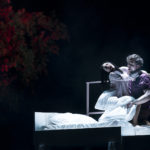 At Theater an der Wien, the Overture (Vienna Symphony Orchestra under Oksana Lyniv) introduces us to Joan (Lena Belkina)- hooded- in a high tech, steel kitchen, all mod-cons. Her father, Thibaut of Arc, (the distinguished bass Willard White), is having sex with, assumedly, her mother, over a kitchen table. Belkina’s Joan looks on in disgust- in her hoodie, a long, grey, boucle-knitted cardigan. There’s a row and a fight. She’s the moody teenager; you half expect her to bring out her phone. (That would stream her angst off.) But Belkina’s mezzo is powerful, that of a mature woman, her moving performance a tour-de-force. White, in a check shirt-jacket, black polo, is reading a paper, (Le Monde), disturbed by the world situation (war with England, France’s defeats, their weak King, and his successor?) He wants Joan married off to Raimond (Raymond Very) for her protection. The meeting doesn’t work out, Joan has another agenda. Very, as the straight, be-suited, businessman – to her, middle-aged – isn’t her type. (He does, however, have a gorgeous tenor.)
At Theater an der Wien, the Overture (Vienna Symphony Orchestra under Oksana Lyniv) introduces us to Joan (Lena Belkina)- hooded- in a high tech, steel kitchen, all mod-cons. Her father, Thibaut of Arc, (the distinguished bass Willard White), is having sex with, assumedly, her mother, over a kitchen table. Belkina’s Joan looks on in disgust- in her hoodie, a long, grey, boucle-knitted cardigan. There’s a row and a fight. She’s the moody teenager; you half expect her to bring out her phone. (That would stream her angst off.) But Belkina’s mezzo is powerful, that of a mature woman, her moving performance a tour-de-force. White, in a check shirt-jacket, black polo, is reading a paper, (Le Monde), disturbed by the world situation (war with England, France’s defeats, their weak King, and his successor?) He wants Joan married off to Raimond (Raymond Very) for her protection. The meeting doesn’t work out, Joan has another agenda. Very, as the straight, be-suited, businessman – to her, middle-aged – isn’t her type. (He does, however, have a gorgeous tenor.)
In a choreographed ballet sequence, young girls in pretty white dresses are being groomed by handsome young men in black suits, like young executives. The implications are gross- historically (15th century), girls were married off from twelve years old.
In one of many controversial scenes- a dream sequence- Joan is lying on her bed, her room like a Tracy Ermin installation, decked out with posters of female icons: a Warhol poster of Marilyn Monroe, one of Patti Smith, Women’s Rights slogans everywhere. It’s as if Director Lotte De Beer is determined to cast Joan as a feminist emblem, even if it confuses the historical narrative.
Joan, cut loose, escaping with her rucksack, is seen observing a religious order wearing ‘medieval’ smocks, like in an historical tableau. She stands apart- alien- as if from another world. But then her psychic disorder- or religious calling – positions her as the outsider. Belkina sits around moping.
Then Belkina, now in white – a night gown, or oversized man’s shirt- visits the court of French King Charles VII (Dmitry Golovnin). Though under existential pressure, he’s entertaining his beloved mistress Agnes Sorel (Simone Mihai). Neglecting his state duties, he’s unmoved by the mortally wounded soldier dragged in; or by the resignation of his chief soldier Dunois (Daniel Schmutzgard’s impressive tenor.)
The Archbishop (Martin Winkler) tells him about the defeat of the English, the French victory, and ‘the glorious maiden who inspired the soldiers.’ Belkina as Joan stands off-stage, observing all from a distance, as if she’s dropped in from a time machine. Nevertheless, the set for Charles’ court is elegantly designed, albeit minimalist, and the costumes in burgundy, splendid: even the oak tree is bathed in pink. 
In the plot, Joan enters, telling the holy Patriarch about her visions that inspired her to lead the fight. On the King’s orders, she is put in charge of the army. Where are your parents, and where do you come from, they sing. Her father enters, White sceptical of his daughter’s powers, while the people’s chorus – Arnold Schoenberg Choir on marvellous form – sing inspired by her calling.
Act 3 (after the interval) opens with a sensation: an aerial battle, Joan and an ‘English’ soldier Swords raised, they’re in fierce combat, floating on wires suspended over the stage. Then they fight it out down to earth, Joan against the knight. She strikes him down, knocks his helmet off. Very realistic swordplay (using doubles.) Her sword raised, she’s poised to kill him, but cannot. He, Lionel, (outstanding Icelandic baritone Kristjan Johannesson), isn’t English, but, he explains, a Burgundian soldier who’s lost his land. They eye each other up. She sings, shocked by the passion aroused in her. No one is safe, why should she save him? Belkina seems to stagger, her faith is broken, (a condition of her calling that she sacrifice earthly pleasures and remain chaste.)
She’s made herself a bed on top of a stack of furniture (rather like her room.) He, (Johannesson), clambers up; t-shirt (burgundy), no armour, but amour. With you, oh God! Why has she given up the fight, got involved. Belkina and Johanesson are ideally cast, their duets outstanding, probably the high point. He fondles her thighs.  (We think of Tchaikovsky’s own forbidden love: his homosexuality suppressed by his religious faith.)
(We think of Tchaikovsky’s own forbidden love: his homosexuality suppressed by his religious faith.)
Then we notice the white shirt soiled, the red mark. Alarm! Lost virginity; chastity, a commodity traded in patriarchy, tarnished . Blood-splattered sheets are pulled in all directions like banners, director de Beer making a big issue about this. And Joan is also compromising her inviolability as a saintly religious figure. Her father and his chosen suitor Raimond appear. White reads her diaries: Raimond however is understanding and prepared to release her from her engagement. There follows a problematic scene, in which the religious followers are seen fondling and fetishising the blood-red soiled sheets, as if they’re imbued with a religious power, (menstrual blood rumoured to have mystical properties.)
She cries out, oh God, my father! He, sneering, mocks her, you were heaven-saved? While the French celebrate Joan the victor, her father suspects her acts to be the devil’s work. White sings, vowing to clear her mind of Satan, even to her death. He forces her to publicly declare herself holy, and pure. Joan stays silent, conscience-stricken, aware of her guilt. The people’s chorus sing, Enlighten us, divided whether to stand by her, or renounce her.
Like a Lady Macbeth, she scratches herself, in self-disgust. She discards her sheets, pulls out her old clothes. Her soul is doomed, she sings…And gets back into her jeans and hoodie, and retreats back to her bedroom. A man has brought her down, but, she sings, there’s no doubt of the flame burning in her heart. Johanneson appears at the window and jumps through. There’s a wonderful duet, reaffirming their love.
From the sublime to the ridiculous. ‘Crusaders’, English soldiers in chain mail brandishing swords, burst into this 21st century household? Lionel is killed, and Joan is captured…
Oh, dear! The stage is taken over by a demonstration of female power through the ages: suffragettes, ‘Votes for Women’ placards, ‘Pussie Riot’, women protesting in hoods, England’s Elizabeth 1 (she’s 16th century, of course.) Belkina is pushed around, jostled from one to the other. The people are undecided whether she’s witch or saint. She’s tied to a tree. It appears, at first, as if she’s being stoned to death, but finally she’s burned at the stake, (reportedly, holding a cross, crying out to God, prepared to die.) Tchaikovsky historically correct, whereas Schiller’s play has her die in battle.
It must be said that, musically, this production was peerless. Oksana Lyniv conducted Vienna Symphony Orchestra passionately, eliciting wonderful playing. The cast was top rank. And the staging? (Clement & Sanou) Sumptuous, beautifully colour-coordinated in the mainly ‘period’ second half. But the agit-prop Feminist agenda? At times, Tchaikovsky’s wonderful score felt like the wrong soundtrack. PR.20.3.2019
Photos:Joan (Lena Belkina);Lena Belkina and Arnold Schoenberg Choir, Lena Belkina and Kristjan Johannesson (Lionel); Featured image: Doubles for Joan and Lionel (Helena Sturm, Sebastijan Gec)
(c) Werner Kmemitsch / Theater an der Wien

I discovered your blog site on google and read a couple of your early posts. Maintain the great operate. I recently additional your Feed to my MSN News Reader. Seeking forward to reading a lot more within you down the line!…